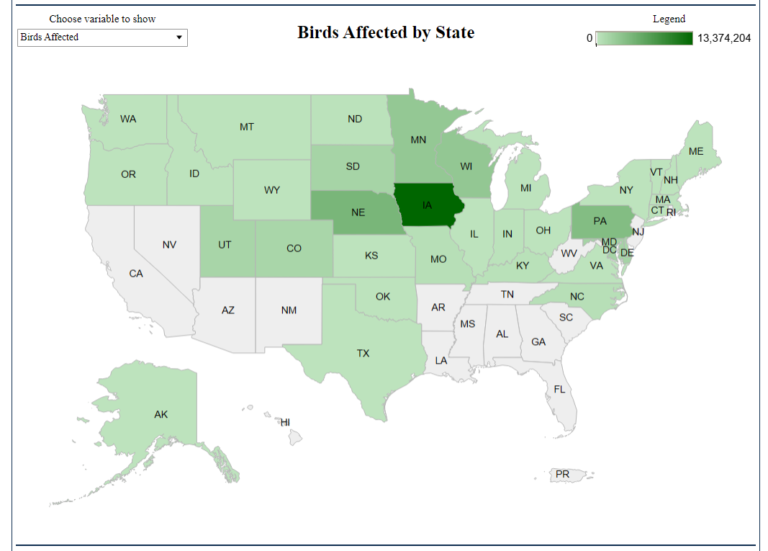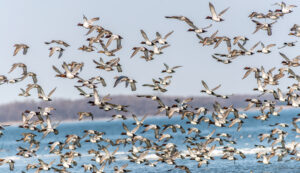Avian influenza (bird flu) is spreading across the globe, and causing concern across the U.S. As of May 16, 2022, 34 states had at least one highly pathogenic avian flu (HPAI) infected flock, as confirmed by USDA Animal and Plant Health Inspection Service (APHIS). This included 318 flocks (178 commercial, 140 backyard) with a total of 37.87 million birds affected, with the highest concentration in Iowa (13.37 million affected birds).
While HPAI is not a food safety concern, with no evidence to suggest that eating cooked poultry or eggs could transmit the virus to humans, it is a reportable disease by the World Organization for Animal Health (OIE), required to be reported to USDA and state authorities. Due to its impact on flocks, avian influenza has significant economic consequences for producers and processors. Depopulation of flocks is costly, and restriction of movement and trade of poultry products can be devastating for affected producers. Egg processors and graders can be forced to shut down due to restricted supplies of eggs and birds.
According to the APHIS publication, Protect Your Poultry from Avian Influenza, the virus spreads quickly by direct, bird-to-bird contact as well as indirect contact with contaminated surfaces or materials. The virus also can be spread with movement of poultry and poultry equipment; in manure; on egg flats, crates, or other farming materials and equipment; and even on human’s clothing, shoes, or hands. Additionally, wild fowl can carry the virus, even while showing no signs of illness, but some strains (such as the current H5N1) can become highly pathogenic, extremely contagious, and deadly in domestic poultry.
In fact, it takes just one contact with this virus to sicken or kill a bird, and the virus can multiply and infect every bird on the premises in a single day. Because of this, federal law gives USDA the authority to depopulate flocks to stop disease spread. The welfare of the animals is given as much consideration as practical, but the situation is understood to be extenuating. USDA’s goal is to complete depopulation within 24 hours of first detecting HPAI at a property.
To help prevent spread and preclude a need for the depopulation of a flock, APHIS recommends that both commercial and backyard poultry owners make biosecurity an “every day, every time” practice. Biosecurity refers to everything you do to keep diseases away from birds, property, and people. It includes both structural (e.g., the physical construction and maintenance of coops, pens, poultry houses, farms, and other facilities) and operational measures (practices, procedures, policies that are consistently followed). Some of the specifics include:
- Restrict traffic onto and off the property. Prevent visitors from having contact with the flock and avoid visits to other poultry farms or with bird owners.
- Disinfect shoes, clothes, hands, egg trays or flats, crates, vehicles, and tires. Wash hands and change clothes before entering and exiting the poultry area; wear disposable boot covers and coveralls when possible.
- Clean and disinfect tools or equipment before moving them to a new poultry facility.
- Isolate any new or returning birds for 30 days to watch for signs of illness before placing them with the flock.
- Keep wild birds and rodents out of poultry houses and coops. Secure feed bins and water to prevent wildlife contamination.
- Know the warning signs of infectious bird diseases. Watch for and report them at the first sign of illness.
- Have a site-specific biosecurity plan in place and ensure that anyone who enters the poultry area or has contact with your birds knows and follows the rules.
How far the disease will be spread and how many birds will die or need to be culled before the disease wanes is yet to be seen. But the closer every poultry owner watches and maintains their flocks, implements all possible biosecurity practices, and immediately reports any signs, the more likely containment and mitigation will become.






